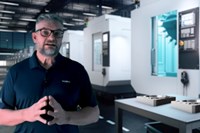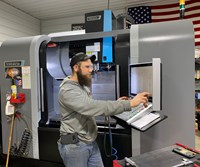Blacken Aluminum In-House
Birchwood Casey’s Lumiclad black oxide process is a safe, in-house method for forming a durable black finish on virtually all aluminum alloys, the company says. Unlike black anodizing, which uses electrolytic chemicals to form the coating, the black oxide process uses a dip-tank procedure. According to the company, the non-dimensional (1.
Birchwood Casey’s Lumiclad black oxide process is a safe, in-house method for forming a durable black finish on virtually all aluminum alloys, the company says. Unlike black anodizing, which uses electrolytic chemicals to form the coating, the black oxide process uses a dip-tank procedure. According to the company, the non-dimensional (1.5-micron) finish is tightly adherent to the aluminum substrate with no ruboff, and it can be used as an alternative to black anodizing for various types of industrial tooling and machine components.
The process requires no electrical current and no clamp-on racking, which lowers labor costs compared to conventional black anodizing methods, the company says. Small stampings, fasteners, screw machine parts or other low-value parts can be blackened. The process can also accommodate both large and small parts on racks and smaller parts handled in bulk.
The non-dimensional finish will not shrink hole diameters or add measurable thickness. According to the company, part dimensions are easily maintained, without requiring critical surfaces to be undersized to allow for excessively thick coatings.
The company says the process is fast—30 minutes for most alloys—and that it meshes well with workflow patterns, thereby eliminating the lengthy turnaround times and costs of outside finishing. In-process inventory levels can be lowered because parts can be blackened on a just-in-time basis.
According to the company, operators report that the process is easy and safe to operate. Using a tank setup that operates between 70° and 200°F, the process line is designed to operate as a self-contained, zero-discharge system. Rinse waters are purified and recycled via an ion exchange system. No discharge permit is required, because nothing enters the drain, the company says. The process line can be located almost anywhere in the plant.














.png;maxWidth=300;quality=90)
